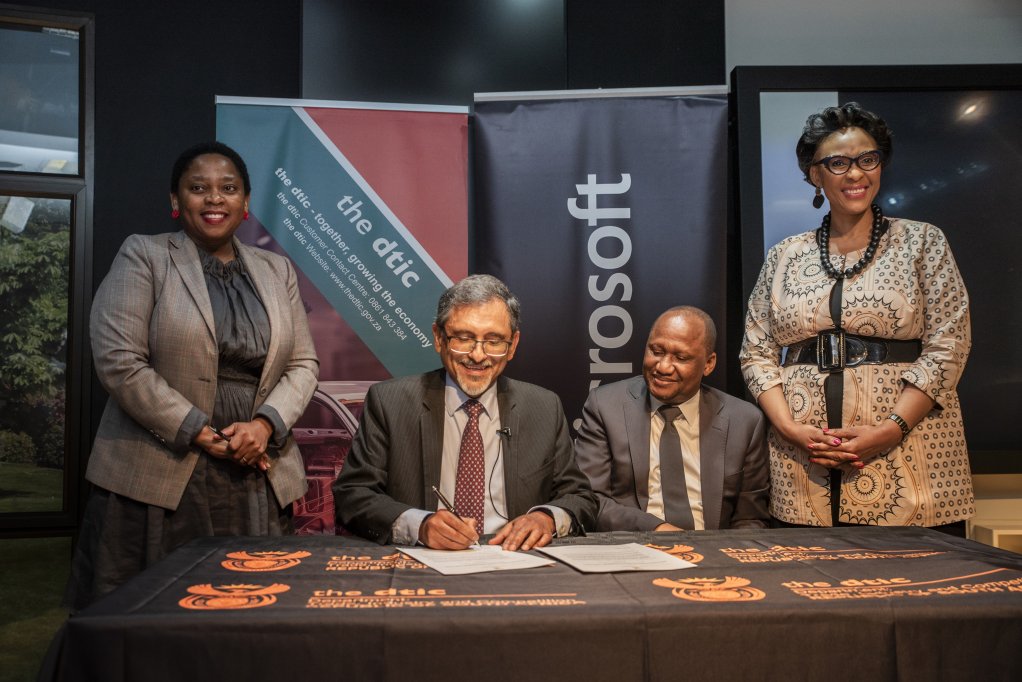
DRIVING GROWTH THROUGH TECHNOLOGY Transformative technologies, such as cloud and AI, have the potential to solve some of South Africa’s most pressing challenges, while also unlocking opportunities to fuel inclusive, sustainable economic growth
Technology company Microsoft and the Department of Trade, Industry and Competition (the dtic) have entered into an empowerment agreement to unlock programmes to support skills and capability development, as well as enterprise development for youth and small, medium-sized and microenterprises (SMMEs).
The agreement provides for a significant investment, estimated at R1.3-billion, by Microsoft South Africa over the next ten years, to support SMMEs and black industrialists in navigating the changing landscape of the technology revolution.
Microsoft South Africa aims to spur SMME development, create jobs and local opportunities, and prepare the country for artificial intelligence (AI) transformation.
“It will enable SMMEs to be engines of growth and expand local industry for South Africa,” says Microsoft South Africa MD Kalane Rampai, explaining that the investment to accelerate capabilities for SMMEs and youth will result in the digital transformation of up to 42 SMMEs and startups, including access to markets to drive growth and become net job creators, and align with 18 technical, vocational education and training colleges to use technology to create better learning experiences for students, prepare them with future-ready skills and enhance employability.
Further, the agreement will see 200 SMMEs and more than 2 000 individuals being equipped with advanced AI and other capabilities to narrow the current skills gaps, as well as support up to 20 advanced research and development projects to address the current and future policy needs of the country in cybersecurity and AI.
“We are providing a platform for SMME development that is founded on technology and digital transformation, as well as market opportunity. As Microsoft, we believe that SMMEs can contribute significantly to developing a digital economy and contribute to the wider use for the growth of Africa, and that we have the technology ecosystem to really support the scope and success by collaborating with government,” he continues.
“The intended outcome for this investment in South Africa is not only to ensure that citizens are part of the digital economy, but, more importantly, to ensure that we meet the aim at reducing the challenges of poverty, inequality and unemployment.”
As part of the agreement, Microsoft South African is establishing a R660-million enterprise development fund, which will support SMMEs in both the technology and nontechnology sectors, as well as provide for advanced skills development in AI and other emerging technologies for young South Africans.
Trade, Industry and Competition Minister Ebrahim Patel says this will boost small business development and strengthen the growth of black industrialists.
“The fund will assist black South Africans in nontechnology sectors to harness the power of technology and improve their competitiveness and ability to innovate and expand their operations. It will also act as a bridge to enable young people to get training, certification and job placement, so that talented South Africans gain access to the opportunities that arise from an increasingly digitalised world,” he points out.
Microsoft will also establish a Research and Development Council to pursue critical research projects and support initiatives linked to the technology revolution in South Africa, a skills development fund, which will enrol more than 1 000 youth in intensive 8- to 12-month certified learnership programmes and a technology fund with a focus on early startups.
Among these initiatives is a partnership with the Localisation Support Fund to provide dedicated technology resources to support the integration of advanced technologies into South Africa’s localisation and industrialisation programme.
“The agreement we signed today will be the largest financial commitment by a single firm under the Equity Equivalent Investment Programme. To add R1.3-billion, we have breached another barrier,” he says, adding that there is hardly any part of the economy and society that is not being enriched and reshaped by technology.
“We have seen with previous technological leaps that these advances hold the promise of significantly improving productivity.”
Microsoft Africa president Lillian Barnard says transformative technologies, such as cloud and AI, have the potential to solve some of South Africa’s most pressing challenges, while also unlocking opportunities to fuel inclusive, sustainable economic growth.
She highlights a significant opportunity, with McKinsey studies showing that, should Africa capitalise on only 10% of the global opportunity that exists in the future by AI, it will result in GDP growing by $1.5-trillion.
In South Africa, productivity growth could triple and the pursuit of the new technologies could add a percentage point to the country’s real GDP.